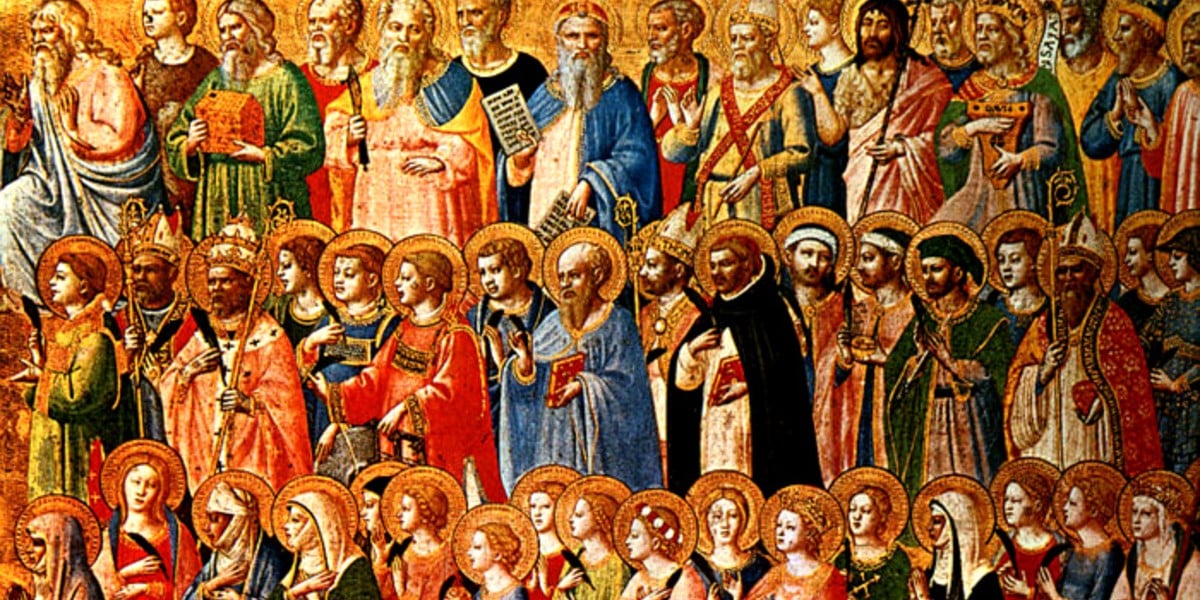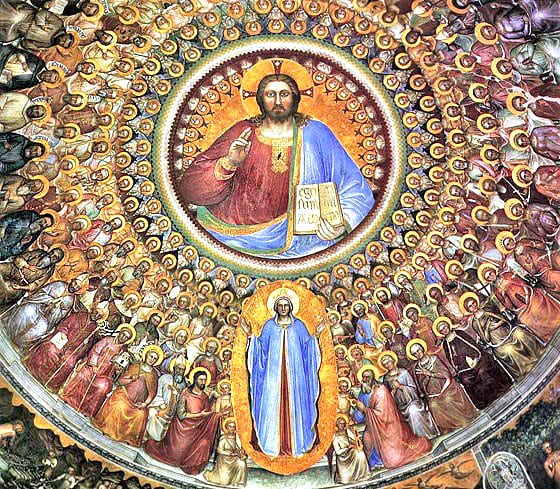Regina Caeli – Queen of Heaven, Rejoice!
The Regina Caeli, Latin for “Queen of Heaven,” is a hymn and prayer ...

This post is also available in: Spanish, Italian
All Saints Day, observed on November 1, gives us the opportunity to honor the multitudes of Christians who are in heaven yet are not on either the canonized saint list or the liturgical calendar. But it also provides us the chance to reflect on just what holiness is and who is called to sanctity. To LISTEN to this post read by Dr. Italy, click on the play arrow on the left, directly below this paragraph.
At age 16, I thought that aspiring to holiness was out of the question. If you really wanted to be holy, I thought, you had to be a priest, nun, or brother. And you had to spend your days doing “religious stuff” like praying, preaching, teaching catechism, or serving the poor. But I had developed an interest in the opposite sex and was headed toward a career in music. So I was disqualified. The best I could hope for was to avoid breaking the 10 commandments, get to confession when I failed, not miss Mass on Sunday and toss a few bucks in the collection each week. That way, I could at least make it to heaven after a lengthy stay in Purgatory. But true sanctity? That was out of my reach.
If holiness were about marital status or what you did for a living, I would have been right. But the Second Vatican Council made very clear that my assumptions were wrong. Holiness is not about what you do but with how much love you do it. Holiness is really the perfection of faith, hope, and sharing in God’s very nature, which is love (I John 4:8). We are talking about a special kind of love here, the love that gives freely of itself to another, that even lays down its own priorities, interests, and very life, for another.
So is holiness difficult to attain? No. It is impossible. At least on our own steam. But that’s the thrill of it all. God invites us into an intimate relationship with Him through Jesus. He takes up residence within us and makes it possible to love with His love. Grace is the love of God that comes into our hearts as a free, undeserved gift and enables us to be like God.

Image by an unknown artist. Public domain.
So that means spending all our time in chapel? No it means doing daily, ordinary things with extraordinary love. The Virgin Mary, our greatest example of holiness, was a housewife and a mother. Jesus and his foster father, St. Joseph, apparently spent most of their lives doing manual labor. But when Mary did the wash, she did it for love When Joseph made a table, he did it for love. When hardship and danger threatened, they met it with faith, hope, and love.
So holiness is for every baptized person, regardless of personality type, career, age, race, or marital status. In baptism, we are all reborn with the spiritual muscles necessary to get us across the finish line. Yet these muscles must be nourished and exercised if they are ever to develop and carry us the full distance. God provides the necessary nourishment in the Word of God and the Eucharist. And he sends us ample opportunities to exercise.
But there’s the rub–many of us don’t want to exert ourselves. It can be uncomfortable. We stretch a bit to finish school, to excel at sports, to win the heart of the love of our lives. But when it comes to the things of the Spirit, we often settle with being couch potatoes.
Leon Bloy, a French Catholic writer, once said “the only tragedy in life is not to become a saint.” Holiness is about realizing our deepest, greatest potential, becoming who we were truly destined to be. What a shame it would be to miss it!
For a great All Saints Day reading from St. Bernard of Clairvaux, click here
For a 15 minute podcast on the meaning of ALL SAINTS day, click here.
This post focuses on holiness and sanctity as the perfection of faith, hope, and love. It serves as a reflection on the scripture readings for November 1, the Solemnity of All Saints Day (Revelation 7:2-14; Psalm 24; I John 3:1-3; Matthew 5:1-12).
Banner/featured image The Forerunners of Christ with All Saints and Martyrs by Fra Angelico, ca 1420. Public domain.
Marcellino D'Ambrosio
Posted at 17:16h, 30 JanuaryThanks for the clarification, Fr. Thomas, and for your kind words of encouragement. Point well taken.
fr. thomas
Posted at 17:16h, 30 JanuaryGreat column, Dr., as usual. I am always grateful for your insights and scholarship. However, and as a minor point, I must say that while I am a priest of Jesus Christ for 15 years, I too share with you a lifelong, inherent interest in both the opposite sex as well as music. While I think I know what you meant to express, my concern is that folks might discern not only holiness, but even religious/priestly life as mutually exclusive and/or opposed to interest in the opposite sex (and even music). I minister with many good, and faithful, priests who share your interests. I point this out only because our priesthood conjures many caricatures. Keep up your great work of evangelization; it is very much needed and appreciated.